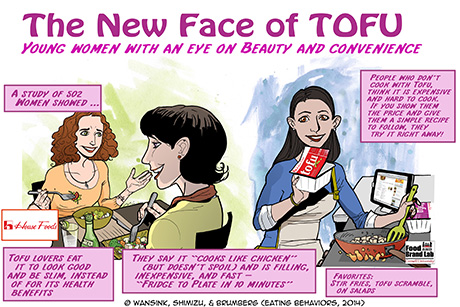Overcoming tofu fear, living the life of soy
By H. Roger Segelken

Given the reputation – strange texture, doesn’t taste good, expensive, hard to cook – it’s a wonder anyone eats the stuff. Better to cook something with a positive buzz – high in fiber, no cholesterol, high in protein and progressive – everyone knows that.
Except that both sets of perceptions apply to the same food product, tofu, the subject of a Cornell behavioral science study: “Dispelling Myths About a New Food Can Be More Motivational Than Promoting Nutritional Benefits.”
“When encouraging nutritional gatekeepers to adopt tofu in their home, it may be more effective to address the myths and change the barriers,” researchers Adam Brumberg, Mitsuru Shimizu and Brian Wansink write in the April 2014 journal, Eating Behaviors. “Nutritionists and health practitioners may be more successful in encouraging the adoption of healthy new foods by dispelling their misconceptions rather than focusing on their nutritional benefits.”
The study began with in-depth interviews of 83 “nutritional gatekeepers,” young women and new mothers who were enthusiastic consumers and cooks of the semi-solid, whitish soy product. The confirmed soy lovers were asked what they liked – attributes the researchers called facilitators – and which unfavorable impressions they had overcome – barriers – to live a life of soy (see infographic).
Then researchers tested the facilitator and barrier sentiments on 502 young women in an online survey. Some participants cooked with tofu and others had never tried, but all were asked how strongly they agreed with barrier statements like, “I don’t know how to prepare tofu.” All were also tested on facilitator statements like, “How important is it that a new food is high protein?”
Knowing who fed their families what and which barriers and facilitators were important to each online participant, the researchers performed a sophisticated statistical analysis.
Their conclusion: Tofu is more likely to be adopted when cooks know that most perceived barriers are not accurate. “Correcting the perceptions that tofu is expensive, difficult to prepare, or easily spoiled should be an effective method for increasing tofu usage,” they wrote. “Solutions for nutritionists and health practitioners to encourage nutritional gatekeepers to adopt healthier cooking habits may lie on dispelling their misconceptions regarding more healthful foods.”
Data collection was made possible by support from House Foods America Corp., House Foods Group Inc. and the Cornell Food and Brand Lab.
Media Contact
Get Cornell news delivered right to your inbox.
Subscribe